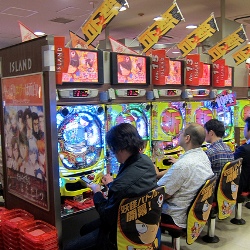A Look Inside Japan’s Pachinko Games Industry

In the United States, the slot machine reigns supreme as the gambling machine of choice, but in Japan, gamblers prefer to spend their coins on a different type of recreational arcade game called Pachinko. Derived from the Japanese word “pachi-pachi” meaning “the click of small objects”, the game has been played in Japan since the 1920s, although it has only recently become a major craze in the country.
Growing Popularity
Pachinko machines look similar to pinball machines, except they are oriented vertically rather than horizontally. To play, a user pulls a trigger to fire steel balls, which subsequently move around a track and fall into the area of play. During their fall, the balls bounce off pins, and should they end up falling into one of the cups at the bottom of the machine, the player wins, but if the ball falls into the catcher instead, the game wins. Because gambling for money is illegal in Japan, winners may receive more balls in order to keep playing, or alternatively tokens that can be redeemed for various prizes similar to skee ball in the United States.
The number of Pachinko games in Japan has risen to nearly 3 million over the last five years, but while demand for the game is on the rise in Japan, not everyone is happy about the Pachinko craze. Critics say that even though players are only winning tokens for prizes, it still constitutes gambling, with the worry being that Pachinko will ultimately lead to gambling addiction. As a result, certain groups have urge for it to be controlled, or even banned altogether.
$209 Billion Industry
Despite criticism, the Pachinko industry is raking in money for operators that provide the games, with recent revenue estimates revealing that Japanese Pachinko players spend roughly $23.3 trillion yen, approximately $209 billion, on the game each year. Just like casinos, operators must invest in security to combat cheating as unscrupulous players may try a variety of techniques to take advantage of the game, for example by using counterfeit tokens and coins to feed the machines. In one instance, a Pachinko parlor lost $60,000 yen to such a scam.
Future of Pachinko
What’s ahead for the game of Pachinko? A lot may depend on the future of gambling itself. In anticipation of the Tokyo 2020 Summer Olympic Games, Japanese lawmakers have moved ahead with plans to allow casinos to operate in the country in order to attract foreign tourists, generate tax revenue for the government. According to some estimates, casinos could help produce in excess of $25 billion a year, but while Japan’s parliament has already passed a casino gambling bill, more legislation will be needed to formally allow for the regulation of a casino industry in the country, including approving a bill to address gambling addiction concerns.
Should pro-gambling Japanese lawmakers have their say and manage to legalize gambling, Pachinko’s appeal may dwindle as players may stop heading to the parlors in favor of casinos where they can have their pick of slot machines, and table games. On the other hand, legal gambling could also prove beneficial for the Pachinko industry as operators would be able to begin offering cash prizes and potentially attract even more players to the machines.
Right now, the future of gambling is uncertain, as is the long-term forecast for the Pachinko industry, but there is no doubt that for now, Pachinko is Japan’s favorite game of chance.
Gambling Review
Ahead of casino legislation, the Japanese government is exploring initiatives to tackle problem gambling, with one measure being adopted including reducing the number of balls that can be won by one-third, as well as slashing potential payouts over a four hour period from around $880 to just $440. The decision was made following the results of a 2014 study that found that 5.36 million people, or 4.8% of the Japanese adult population, could be classified as problem gamblers.
Furthermore, about 70% of those people who got in touch with the Recovery Support Network, which mainly deals with those people addicted to Pachinko, found that each person lost on average a minimum of 50,000 yen ($445) per month.
News of the development was not received well by investors in the main Pachinko operators in Japan, with Sega Sammy Holdings’ seeing its shares slip by 7%, and Universal Entertainment Corp also down nearly 5%.










